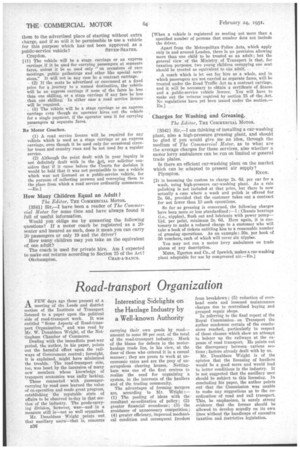Road-transport Organization
Page 70

If you've noticed an error in this article please click here to report it so we can fix it.
Interesting Sidelights on the Haulage Industry by a Well-known Authority
AFEW days ago those present at a meeting of the Leeds and district section of the Institute of Transport listened to a paper upon the political
side of road-transport work. It was entitled "Some Aspects of Road-transport Organization," and was read by Mr. W. Donaldson Wright, of the Nottingham Chamber of Commerce.
Dealing with the immediate post-war period, the author, in his paper, points out the harmful effect upon the railways of Government control ; foresight, it is explained, might have minimized the trouble. The road-transport side, too, was beset by the incursion of many new members whose knowledge of transport economics was sadly lacking.
Thoseconnected with passengercarrying by road soon learned the value of co-operation and made great progress, establishing the reputable state of affairs to be observed to-day in that section of the industry. The goods-carrying division, however, was—and in a xneasnre still is—not so well organized.
Mr. Donaldson Wright points ont that ancillary users—that is,, concerns
B36
carrying their, own goods by road— amount to some 80 per cent, of the total of the road-transport industry. Much of the blame for defects in the motorhaulage trade lies, in his view, at the door of those who entered it in a casual manner ; they are prone to work Id uneconomic rates and are the prey of unscrupulous clearing houses. Nottingham was one of the first centres to realize the need for organizing a system, in the interests of the hauliers and of the trading community.
The advantages of forming mergers are, according to Mr. Wright :— (1) The pooling of ideas with the resultant co-ordination of policy ; (2) greater financial soundness; (3) the avoidance of unnecessary competition ; (4) greater efficiency, improved mechani-, cal condition and consequent freedom from breakdown ; (5) reduction of overhead costs and lessened maintenance charges due to centralized buying and grouped repair shops.
In referring to the final report of the Royal Commission-on Transport the author condemns certain of the conclusions reached, particularly in respect of those clauses which show an attempt to bolster up the railways at the expense of road transport. He points out the discrepancy between various sections; factors already dealt with by us.
Mr. Donaldson Wright is of the opinion that the licensing of hauliers would be a good move and would lead to better conditions in the industry. It is not suggested that the ancillary user should be subject to this licensing. In concluding his paper, the author points out that the Commission was unable to make any suggestions as to the coordination of road and rail transport. This, he emphasizes, is surely strong evidence that the former should be allowed to develop soundly on its own lines withont the handicaps of excessive taxation and restrictive legislation.




















































































































